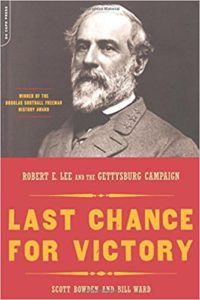For research purposes, I picked up a used copy of Last Chance For Victory. The subtitle is Robert E. Lee and the Gettysburg Campaign. The authors are Scott Bowden and Bill Ward. Bowden has written many books on military issues, especially the Napoleonic wars. I didn’t check into Ward’s credentials.

I began reading this sometime in 2014, when I began writing my book Documenting America: Civil War Edition. As I said in a prior post, I knew I would be including a chapter on Gettysburg, so I thought this would be good research for me. The paperback copy I read is 529 pages long, not including one tabular appendix, but including the many, many pages of end notes for each chapter. I read the first five chapters (221 pages) back then, then put it aside when I put my book aside. But, this April, I went back to work on my book, so went back to reading LCFV, in early May. I think I remembered the gist of what I’d read three years ago.
This is a very good book. Bowden and Ward make a good case that Lee handled himself very well in the Gettysburg campaign, from recognizing the strategic need for it, to planning it, to executing it. Yes, the Confederacy lost this battle, but not because of Lee, they say. In their last chapter, they list 17 causes for the Confederate loss. A couple of them were things that the Union did, or their generals did. Except for that, the authors missed no opportunity to show their disdain of the Northern soldier and his generals. Concerning Lee, they listed only two faults:
- failure to keep a large enough headquarters staff to do all that a commanding general needed done; and
- failure to take tactical control on the third day of the battle, when it was obvious that two of his three corps commanders (and, they actually make a case for all three) failed to execute Lee’s orders, either to the level of incompetence or insubordination. Even the oft-praised General Longstreet came in for harsh criticism for his performance on the third day of the battle.
Everything else, Lee did flawlessly. That cavalry general Jeb Stuart misread Lee’s orders and went gallivanting in Pennsylvania, far enough from where Lee concentrated his army to be absent the first two days and ineffective the third day was Stuart’s fault, not Lee’s. They go into great lengths on this. Their arguments are fairly convincing. It appears Stuart didn’t follow orders, though I can see some ambiguity in the orders. That Ewell’s corps didn’t take Culp Hill on the first day was Ewell’s fault for over-emphasizing the words “if practicable” in the order. On this, I think Bowden and Ward have good grounds for criticism of General Ewell. Many military victories (so I’ve read) have happened when a field commander took the initiative and fought for and took the hill, then held it until reinforcements arrived.
But, they don’t find fault with Lee for failing to come to the front lines on the second day, when the en echelon attack was in progress, and kick his corps commanders in their sorry rear ends and get their divisions and brigades into the action as they’d been ordered to do. Instead, Lee stayed in his headquarters, watching or receiving reports on the action. If he had just taken one of General Hill’s divisions and shoved them to the front, the entire battle would have been different. Maybe.
I have a couple of criticisms of the book. The main one is that the authors fixate on a point and beat it to death. The en echelon attack is the main one, along with the failures of Ewell, Hill, Stuart, and to a lesser extent Longstreet. These were covered in the chapter of that part of the battle, then mentioned in the next chapter, the next chapter, and left beaten to death in the summary. They could have done with much less of this, either covering other things, or making the book shorter. I also found a few more typos than I would have liked. One map for the action on July 1 was labeled as for July 2. But, overall, I would say the typos didn’t bother me.
The comments on Amazon indicate this book is controversial, in that it gives too much credit to Lee, overlooks some of his shortcomings, and fails to say that the Union army and generals had something to do with the Confederacy losing. Since this is my first book to read on Gettysburg, I really can’t say much to that. For sure it is highly favorable to Lee. Whether he deserved those laurels for this battle, someone else will have to determine.
I bought this book for a whopping $0.50, probably at a thrift store. I don’t know that I’ll ever read it again. If I read more on Gettysburg it will be other books. But, for now, I’ll keep it as a reference book. I might have to refer to it again.